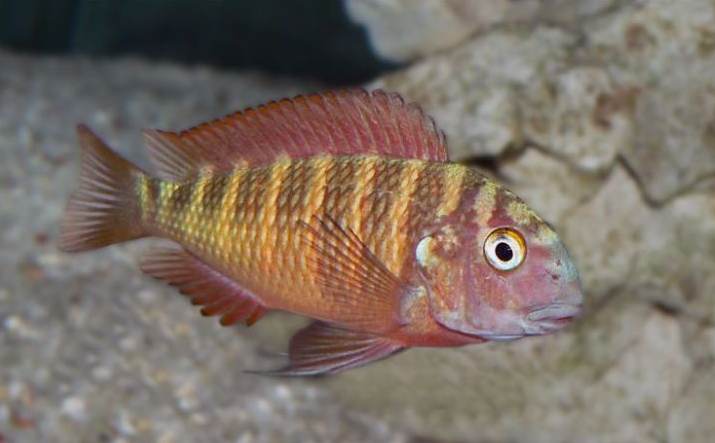- Tropheus
Taxobox
name = Tropheus

image_caption = "Tropheus moorii"
image_width = 200px
regnum =Animal ia
phylum = Chordata
classis =Actinopterygii
ordo =Perciformes
familia =Cichlidae
genus = "Tropheus""Tropheus" is a small
genus of sixspecies ofcichlid fish endemic toLake Tanganyika inEast Africa . The genus "Tropheus" is widespread across all regions of lake Tanganyika, from Burundi in the North to Zambia in the South.Males and females are relatively similar but do display obvioussexual dimorphism . Males attain a somewhat larger size. All species maternally mouthbrood their eggs and fry and it is this characteristic that provides theirlatin name. Tropheus comes from the Greek "trophos " which means "to nurture". The genus is fished lightly by the local population but has never become a staple food fish due to its relatively small size and its habitat which enables it to dart between rocks when threatened.Most species occur along the coastal fringes of the lake at depths of less than 3 metres. These rocky shores, with numerous rocky outcroppings and boulder formations form a habitat similar to many of the
mbuna cichlids of Lake Malawi. This habitat provides shelter and, due to the shallow depth and the long hours of strong sunlight, heavy algal growth on which the Tropheus feed. The only tropheus species to dwell further out and deeper in the lake is Tropheus Duboisi which in general inhabits deeper regions of the lake down to around 15-20 metres. All species are algal grazers and have underslung mouths adapted to raspingalgae andmicroinvertebrate s from submerged rocks.The genus is popular with aquarium hobbyists due to the beautiful markings and interesting behaviour of the fish.
Classification
Six species of "Tropheus" are currently recognised: [cite web|url=http://www.fishbase.org/Eschmeyer/GeneraSummary.cfm?ID=Tropheus|title=Genus Tropheus |author=Froese, R. and D. Pauly. Editors.|publisher=FishBase|accessdate=2007-02-26]
*"Tropheus annectens " Boulenger, 1900
*"Tropheus brichardi " Nelissen & Thys van den Audenaerde, 1975
*"Tropheus duboisi " Marlier, 1959
*"Tropheus moorii " Boulenger, 1898
*"Tropheus kasabae " Nelissen, 1977
*"Tropheus polli " Axelrod, 1977In the Aquarium
"Tropheus" species have been popular in the aquarium trade for nearly a century. The fish have, however gained something of a reputation for fragility and are regarded by many cichlid keeping aquarists to be rather demanding to keep. It is certainly true that they should not be considered beginner fish but neither should they be unfairly derided as difficult. When kept in appropriate conditions, they make superb aquarium fish.
Aquarium Set-Up
Tropheus are best kept in species tanks. They are not suitable community tank fish because their unique requirements will not be met in a mixed set-up and because their innate aggression. Some individuals are more aggressive than others and this is influenced by factors related to the aquarium such as volume and mix of individuals. For these reasons a 300 litre aquarium should be considered the minimum volume.
The aquarium should be set up with piles of flat rocks (slate is a good choice) built up to form crevices and caves for the fish to withdraw into and to help split the tank up and provide territorial boundaries. Fine gravel is suitable, however coral sand or marble acts as a pH buffer increasing the alkalinity and hardness of the water in the aquarium. As Tropheus occur in the surge zone in the wild, the water in the aquarium should be well oxygenated. The aquarium should be well filtered, and small volumes of water should be changed frequently. The water chemistry and temperature should match their natural habitat in
Lake Tanganyika , water temperature in Lake Tanganyika is relatively stable and this should again be mirrored in aquaria.Feeding
Tropheus are algae grazers and in the wild will only consume minute quantities of animal food (ie: micro-organisms taken in with the algae whilst grazing). They have a long digestive tract, and therefore have trouble dealing with higher protein foods. [C Sturmbauer, W Mark, R Dallinger. (1992).Ecophysiology of Aufwuchs-eating cichlids in Lake Tanganyika: niche separation by trophic specialization. "Environmental Biology of Fishes."] As a result, many people say that the majority of commercially available fish foods are unsuitable for them as they are derived from fish rather than vegetable matter. There are many myths concerning this topic however, and tropheus must be provided with a reasonable amount of protein. Protein in quality foods is actually derived from fish. There are several superb vegetable flakes that are available in all shops based on
spirulina and other vegetable matters. But even these contain just as much protein as a quality pellet food. Remember, just because it is green does not mean it's all vegetable matter. That's just dye. They will also do very well on fresh vegetable matters such as romaine lettuce and spinach. The general consensus on feeding is as with all types of tropical fish - it is far better to feed small amounts throughout the day than to give one big feed Fact|date=March 2007.Diseases
"Tropheus" are susceptible to the same sorts of viral, bacterial and stress-related diseases as other fish but should not prove delicate as long as the above issues with water quality and feeding are addressed. They are however known to be particularly prone to a condition called "bloat" which can be very hard to deal with. Bloat is purported to be caused from a range of organisms which include the
flagellate ("Cryptobia " sp.) and/or numerous bacterial species that cause intestinal problems in the genus. Affected fishes discharge white feces, may sway or have swim-bladder problems and frequently stop eating. As with every aspect of fishkeeping prevention is better than cure.References
Wikimedia Foundation. 2010.
